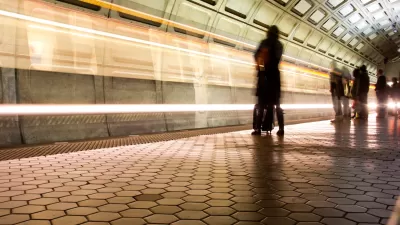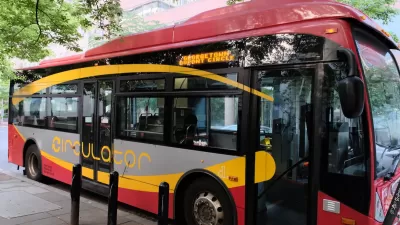The capital’s public transit system, the country’s third-largest, has been plagued by a series of problems ranging from a looming fiscal deficit to train crashes and track fires.

An article by Jake Blumgart in Governing outlines the Washington Mentropolitan Area Transit Authority’s (WMATA) fiscal crisis, the worst in its recent history. “Washington, D.C.’s mass transit offerings could get substantially worse next summer if something doesn’t radically change. WMATA’s most recent public forecast shows a $356 million deficit in the fiscal year 2024 budget, because only 53 percent of the trips taken pre-pandemic have returned.”
The system has also faced a series of crises. “In October, one of Metro’s newest 7000 series trains derailed in Arlington, Va.” Earlier this year, “Metro admitted that half its rail operators have not kept up on their driver certifications. Many were pulled from duty, resulting in further delays. A separate and unrelated report found that the agency’s personnel recklessly disregard worker safety.”
With a new general manager on the way, Metro has an opportunity for another reset. But in interviews and at hearings, outside stakeholders say they do not hear current board members and high-level staffers providing adequate strategies for WMATA’s existential challenges. The gamble seems to be that the system is too big to fail.
Blumgart details the agency’s history of questionable authority and accountability, its confusing and diffuse leadership structure, and the disturbing claim that the agency operates under a culture of noncompliance. The article also describes several options for governance structures that could place more accountability on the agency and find problems before they become full-blown crises. Blumgart doesn’t predict which outcome is most likely to be effective, but asks, “Why not put all options on the table at this moment of extreme uncertainty, and show policymakers from Congress to the legislature and city hall to the C-suites that change can come to Metro?”
FULL STORY: Washington Metro Is a Transit System in Deep Trouble

Maui's Vacation Rental Debate Turns Ugly
Verbal attacks, misinformation campaigns and fistfights plague a high-stakes debate to convert thousands of vacation rentals into long-term housing.

Planetizen Federal Action Tracker
A weekly monitor of how Trump’s orders and actions are impacting planners and planning in America.

In Urban Planning, AI Prompting Could be the New Design Thinking
Creativity has long been key to great urban design. What if we see AI as our new creative partner?

King County Supportive Housing Program Offers Hope for Unhoused Residents
The county is taking a ‘Housing First’ approach that prioritizes getting people into housing, then offering wraparound supportive services.

Researchers Use AI to Get Clearer Picture of US Housing
Analysts are using artificial intelligence to supercharge their research by allowing them to comb through data faster. Though these AI tools can be error prone, they save time and housing researchers are optimistic about the future.

Making Shared Micromobility More Inclusive
Cities and shared mobility system operators can do more to include people with disabilities in planning and operations, per a new report.
Urban Design for Planners 1: Software Tools
This six-course series explores essential urban design concepts using open source software and equips planners with the tools they need to participate fully in the urban design process.
Planning for Universal Design
Learn the tools for implementing Universal Design in planning regulations.
planning NEXT
Appalachian Highlands Housing Partners
Mpact (founded as Rail~Volution)
City of Camden Redevelopment Agency
City of Astoria
City of Portland
City of Laramie





























